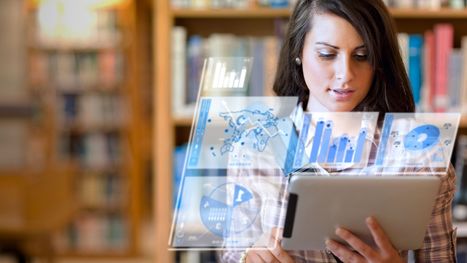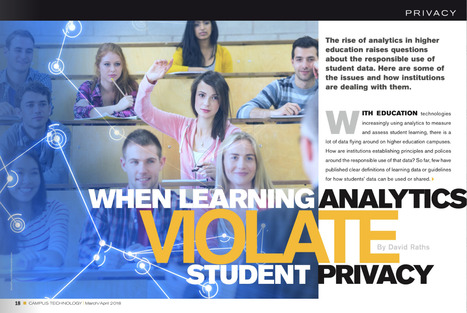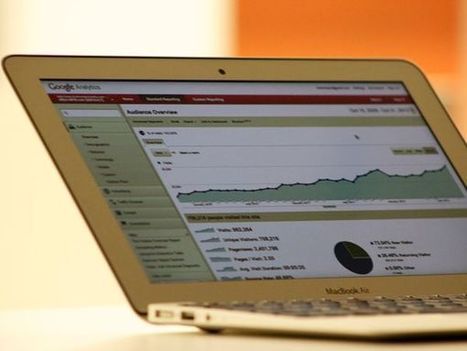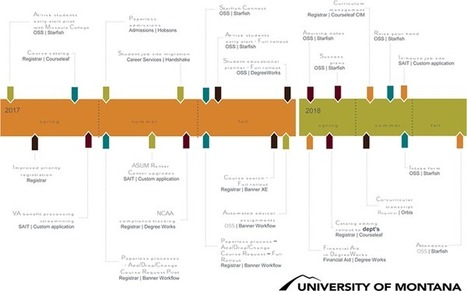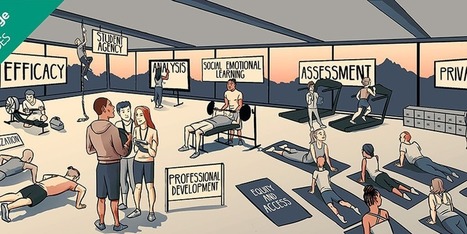 Your new post is loading...
 Your new post is loading...
In light of the significant investments that some colleges and universities are making in their analytics infrastructures, how can an institution arch
This Featured Topic Guide highlights the best and most current EDUCAUSE resources to help you:
Learn: Read about higher education institutional analytics topics and find proven practices that helped other institutions implement business intelligence and analytics programs.
Plan: Benchmark your current data capabilities and lay the groundwork for your institutional analytics strategic direction.
Do: Implement business intelligence and analytics practices and validate your forward progress.
Share: Discuss your lessons learned and contribute your institutional analytics expertise to the higher education IT community.
Since the 2015 release of the EDUCAUSE report The Next Generation Digital Learning Environment: A Report on Research, many articles have been written on various aspects of the NGDLE. In this post, we'll focus on the need for a central repository for learning analytics (see figure 1). Without a central repository, the learning environment — including LMS data and activity records for videos, e-portfolios, and third-party tools — becomes compartmentalized and stove-piped, making it difficult to provide a 360-degree view of the learner and learning environment. This makes it much more difficult to have a combined view of student learning activities that can allow instructors and program managers to ascertain the effectiveness of teaching and learning.
Educators at Summit Prep in Redwood, California use data to shape classroom instruction. From regular surveys, teachers are able to find out the best way to adapt lessons to meet students’ needs. The Summit approach views collecting data as important no matter how that information is gathered. Surveys can be as simple as a thumbs up/thumbs down or as tech-dependent as a Google form. While assessments are the differentiating factor at this school, the focus is on the results of these surveys to shape instruction.
Ian Myatt, director of educational enterprise at the University of Birmingham, discusses how big data analytics will change the way we learn
Students can make gains in taking ownership of their work when they’re given access to their data around that work.
Within higher education, there is near universal recognition that analytics have transformative potential. So why doesn’t every institution have a rob
There is a popular quote attributed to management expert Peter Drucker: “What gets measured gets improved.” In education, the mantra is equally true
As higher education institutions deploy learning analytics platforms to better optimize student learning, the question of what data are collected and in which contexts arises. To fully understand the total student experience, data about student interactions with rec and wellness centers, student support services, and certainly academic advising centers are being collected and analyzed as they're added to the traditional classroom attendance and engagement model.
Yet, when institutions look at potential factors that might impact academic success, libraries may be overlooked.
Blackboard is planning to introduce a new feature in its learning management system later this year to help instructors grade students’ participation in class discussions online. The feature, called the “discussion forum recommended grade,” will use computer algorithms to analyze students’ posts in class discussion forums.
John Whitmer, learning analytics and research director at Blackboard, said that instructors want to use discussion forums to judge students’ participation, but that doing so is time-consuming and difficult since the forums were designed for discussion rather than assessment. These discussion forums are often underused by students, said Whitmer, since there is often little incentive for students to engage
At the Australian International School (AIS) in Singapore, teachers are using research-informed strategies to support differentiation in maths in the elementary years, with a focus on extending those students who are at the head of the pack.
The project grew out of a push to improve the collecting, analysis, interpretation and use of student data. Mignon Weckert, Assistant Head of Elementary School at AIS, says examining existing data more effectively highlighted areas for improvement.
In order not to fail, it is necessary to have a clear vision of what you want to achieve with learning analytics, a vision that closely aligns with in
Key Takeaways
The current learning data ecosystem is a chaotic, increasingly complex jumble that is producing vast amounts of usage data that are poorly understood and poorly utilized.
To accelerate the move to the Next Generation Digital Learning Environment, we need widespread adoption of learning data standards across institutions.
Early proof-of-concept implementations by two universities illustrate the current maturity of learning data standards and how they address real-world problems.
To achieve standards adoption at a broader scale — and reap the considerable benefits NGDLE promises — key challenges must be understood and addressed.
|
Technology is key to the future of higher education. Digital capabilities describe the application of technology to the core functions of an enterprise. Using data from EDUCAUSE Core Data Service maturity and deployment indices, the Digital Capabilities in Higher Education reports are designed to provide a view into the current status of digital capabilities within higher education.
Maturity indices measure the capability to deliver IT services and applications in a given area. They examine not just technical dimensions of progress but also multiple dimensions such as culture, process, expertise, investment, and governance. Maturity indices enable institutions to determine where they are and where they aspire to be.
Deployment indices measure stages of deployment for specific technologies and services, which are aggregated to track progress in an area.
The rise of analytics in higher education raises questions about the responsible use of student data. Here are some of the issues and how institutions are dealing with them.
Panorama is dedicated to collecting data on the whole child, as well as on the whole school, and has created a series of resources to collect data on social-emotional issues that are generally difficult to measure, such as levels of grit, growth mindset, and sense of belonging. Looking at these levels in addition to student scores and grades could help teachers better understand the needs of their students, whether individually or as a group. In addition, Panorama utilizes surveys to measure teacher engagement and family involvement, realizing that these factors are indispensable to school climate.
In today’s climate of prioritizing data-driven practices in education, it is usually teachers and administrators poring over student performance data; rarely is the focus ever on students using data to improve their learning. But recently, researchers conducted a study on two sixth grade science classes in the Midwest, hoping to answer the question of whether middle school students can think metacognitively about their learning and use data about their performance to seek appropriate supports in their learning.
It’s often asserted that some things can’t be measured. But how true is this? And if we can’t measure something, should we stop pretending we can teach or develop it?
Can creativity be measured? What about resilience? Can we measure problem solving? What about ethical reasoning?
We take for granted the measurement of variables such as length, weight and temperature, but it is worth remembering that these variables and their measurement were human inventions. Albert Einstein made this point in the Evolution of Physics when he observed that ‘physical concepts are the free creations of the human mind and are not, however it may seem, uniquely determined by the external world’.
The case studies presented in this article describes efforts by three institutions to use governance best practices to support institutional analytics
The use of big data at work could promote well-being – but only in very specific conditions.
Engineering students at Purdue University can track their study behaviors with Pattern, a quantified-self tool designed to help learners regulate and improve their habits.
Learning analytics is the use of data, analysis, and predictive modeling to improve teaching and learning.
Learning analytics are web-based measurements and reporting about student learning that is intended to help teachers improve the knowledge and skill acquisition of their students. This maximizes student learning potential while enhancing teaching and delivery methods. Though its application to education is relatively new, scientific disciplines have been using it for over forty years. Expansion into scholarship was birthed by advanced technology, and the data trails learners leave while using the internet. The data provides several benefits to aid educators and students. In this piece, we will discuss those benefits. Curriculum Mapping and Competency Determination In curriculum mapping, we identify …
If you think data—in education, or any field—is cut and dry, think again. Working with data in the classroom, especially, can be either exhausting o
|
 Your new post is loading...
Your new post is loading...
 Your new post is loading...
Your new post is loading...










